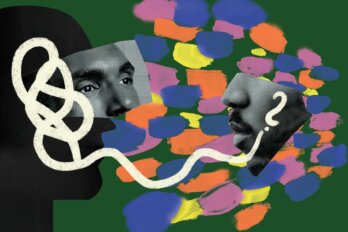“S o, what do you think about Black Lives Matter hijacking the Pride Parade?”
The question took me by surprise. I had been talking about my journalism career—I mainly cover race and gender issues—when this statement, disguised as an innocent question, shot out into the air, wounding me with the same dangerous language (“hijacked”) that I reserved for far-right and conservative white folks. Except it came from the mouth of a family member.
I had spent the summer vigorously defending Black Lives Matter’s actions in my work and social interactions. I felt emotionally invested in the issue at a time when people were becoming increasingly vocal about race relations in Canada. Now I was trying to defend the group against a blood relative who used to play with me as a baby.
I am an anomaly in my family. I’m an only child, born out of wedlock to a single Pakistani mother and an absent Jamaican father, and raised in a loving South Asian family. Though I resemble my mother and grandmother, I have Black Caribbean features; while they spend hundreds of dollars perming their hair, mine is naturally thick and curly. They were so confused by its unruliness when I was younger that all they could do was compress it into braids saturated with Dippity-do and Infusium 23 detangler. For almost twenty years, I was the only Black biracial person in my family.
In high school, I realized being biracial was incredibly complicated. I had trouble making Black or South Asian friends—kids from both groups too puzzled by my ethnicities to know how to approach me. It was then that I noticed I looked different from the rest of my family—much to the surprise of my mother and grandfather, who were oblivious to the stark difference in our physical traits. The rest of my family never seemed to notice my difference either.
However, the way I was perceived and subsequently treated by strangers reeked of anti-Black racism. I moved to the predominantly white city of London, Ontario, to attend Western University at the age of eighteen. The impact of anti-Black racism—and racism in general—from individuals and societal structures was so profound for me and my identity then, as a sheltered girl from the multicultural city of Toronto, that I dedicated all my academic papers, then my writing, then my journalism career, to dissecting race relations.
But my writing about anti-Black racism baffled my South Asian family. Racism, police brutality, carding, Black history in Canada—all the things I wrote and cared about were never brought up in conversation. For a while, I misread their silence as acceptance of the subjects I covered, but instead, they were confused. Finally, at a party, I got the answer I feared. “But you’re not one of them,” a distant cousin scoffed. “You’re one of us.”
It wasn’t the first time I had heard this, but that didn’t make it any easier to understand. My existence is bound to a group my family members turn their noses up at. Their attitude implies that I shouldn’t worry because one part of me is still morally superior—even though the other part may be inherently degenerate.
Members of my extended family still don’t seem to understand that I share very different experiences than their own. I cannot be one of them when I am constantly asked if I (the friend) need a separate bill when we’re out for dinner. Not when we travel to Karachi and family friends think I’m adopted. Nor when I am doubled over in agony each month by endometriosis, a condition that affects overwhelmingly Black women. Or when white men tell me I’m cute for a Black girl, or when they call me a nigger. Explaining this is exhausting and fruitless. They don’t get that I am not them but, by nature, something quite different.
M ixed-race people are one of Canada’s fastest growing demographics, with more than 360,000 mixed-race couples reported by Statistics Canada in 2011—more than double the total from twenty years ago. Though Canada is a multicultural country, things get messy when sex, love, marriage, or children are involved. For bi- or multiracial people, having the support of your family when you share about the racism you experience is a complicated situation, especially when one side is not just considered a visible minority group but also defamed by social and historical stereotypes. You may feel the love of a family that shares one part of your heritage, but you also may feel its hatred or disdain for the other ethnicity within your DNA. Time and again, the parents of bi- and multiracial children face difficulty and tension when trying to understand their offspring’s differing experiences.
For my family, namely my extended family, the tension is not in the way I identify but in the subjects I choose to write about. I don’t think members of my extended family are intentionally malicious; they are quite taken aback when I call out their problematic behaviour or launch into a verbal essay refuting their beliefs. But part of being supportive is knowing when your assumptions are out of whack. In my family’s case, adjusting those assumptions would mean realizing I don’t experience the same discrimination they did when they first arrived in Canada in the 1970s—I experience a different kind of oppression—and understanding that my writing about anti-Black racism doesn’t mean I’m choosing a side or turning my back on the family I grew up in.
Anti-Black racism in South Asian communities is alarming but rarely discussed. Though a minority group, South Asian people are often considered superior to Black people in terms of status, skin colour, and morality. They can use this superiority against Black groups. Some use the derogatory term kala to refer to Black people and harass, physically attack, and discriminate against them when they visit South Asian countries. (A Nigerian master’s student experienced horrific racism while studying in Noida, India, and African students have been physically attacked in south Delhi.) Indigenous African populations in India and Pakistan that have been there for centuries—such as the Siddi—are pushed to the margins of society, often living in poverty, never given the chance to be a part of the larger community.
It’s a shocking revelation, considering South Asian and Black people have worked together in the battle for freedom for decades, especially through writing. When mainstream American newspapers presented stories about civil disobedience during India’s fight for independence in 1942, the Black press covered the independence movements as resistance movements, and Black activists supported the country’s independence. It was the United States civil rights movement of action and activism that helped secure the rights and freedoms that South Asian people were also able to enjoy, and in Canada, both groups struggled against the words printed in Canada’s immigration policy that made obstacles to immigrating to the country.
Younger South Asians continue to come out and condemn anti-Black racism in their communities through writing. Arti Patel, a Toronto-based journalist, wrote a piece for HuffPost Canada called “South Asians Really Need to Stop Saying the N-Word.” Patel says she’s lost track of the number of times she has observed South Asian people using the term. “South Asians can agree how anti-black many other South Asians in our communities and families can be,” she writes. “Continuing to use this word—even if you’re not doing it in a racist way—makes it seem like we’ve moved beyond the issue. We haven’t.”
Following the criticism after Black Lives Matter Toronto staged a sit-in during Pride 2016 until nine demands were met (which included support for Black and South Asian groups at Pride), Asian Canadians launched a letter campaign to address anti-Black racism in their communities and families. The letter details the unique experiences with discrimination, slavery, and racism that Black people face and how they have helped secure rights for Asian Canadians. “Part of that means speaking up when I see people in my community—or my own family—say or do things that diminish the humanity of Black people,” part of the letter reads. “I am telling you out of love, because I don’t want this issue to divide us.”
Writing that is honest and powerful is needed, now more than ever, given the current state of anti-Black racism in Canada. It has the power to expose the truth, help people understand, and help people learn a little about the lives of those unlike them. At a time when our rights are being restricted and we are wholly changed by violence and discrimination, sharing our stories and the experiences of others is fundamental, as is calling out other racialized, oppressed groups for internalizing and using whiteness against one another—even when it’s by our loved ones.
Family never equates to automatic allyship, and no biracial child can fix decades of a loved one’s uncorrected bias. And it’s not our job. Our Canadian multicultural landscape likens bi- and multiracial children to the future; it romanticizes us—our beauty, our mystery, our possibility—without acknowledging our struggles. While our physical presence can make our families and societies reevaluate their views, it is ultimately up to them to actively confront themselves.
I won’t stop writing about anti-Black racism, and I won’t stop sharing it with my South Asian family. In the several years that I have been writing about race, my immediate family has started to engage in the conversations I write about, paying more attention to anti-Black racism, acknowledging that I also identify as Black, supporting me, and feeling my fear and rage when I encounter racism. They know that we are not unchained from the same bloodline because I experience the world differently. They’re starting to accept that not writing about South Asian issues doesn’t mean I don’t appreciate where I’m from. With some persistence and patience, I hope other members of my family will understand that their love for me also must include playing an active role in erasing racism, even if it means confronting themselves.
A funny thing happened not very long ago. At a dinner party, I was talking about my journalism career with a cousin, when the words shot out into the air: “So, what do you think about Black Lives Matter hijacking the Pride Parade?” I told him what I thought—the problematic language used by media, the reason for the sit-in, the things he didn’t know from reading the paper, why I was defending their tactics. He knew none of it. After an apology, he said he wanted to know more. And then more about everything I write about.
At that same table, another family member interrupted to say I wasn’t one of “them,” so she didn’t get why I was always writing about Black issues. I tried to explain how my identity was tied to Blackness. She kept at it. In a moment I wasn’t expecting, my cousin put out his hand towards me, his voice silencing the growing, bitter tension just in time, before embarrassing tears fell from my eyes. “Your experiences are your own, and you identify how you want to,” he said. “You be who you are.”
It was a small gesture that caused a mountain of relief. The next day, my Pakistani cousin sent me an email. He asked if I could send him more of my work.
From the book Black Writers Matter edited by Whitney French, copyright © 2019. Reprinted by permission of University of Regina Press.





